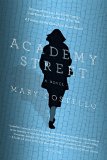Summary | Excerpt | Reviews | Beyond the Book | Read-Alikes | Genres & Themes | Author Bio

This article relates to Academy Street
Mary Costello's Academy Street follows the life of Tess Lohan, an introverted Irish woman who often feels anxious in social settings, largely preferring the world of books and imagination to external interactions. At various times in her life, she finds herself at a loss for words, in situations that "[take] all her talk away." After one particularly frightening experience as a child, Tess loses her ability to speak altogether. She falls silent for months, unable to utter a word.
She joins her hands and says a Hail Mary. She listens for the words, to test her sound. But no sound comes. She prays louder, harder. She gives a little cough, and tries again. She starts to cry.
It's likely that Tess suffers from "selective mutism," an anxiety disorder (found in children more often than adults), whereby the person is unable to speak in certain social settings, such as school, or wherever there is an expectation of verbal communication. The intensity of this social anxiety can be painful for the child, who is literally afraid of speaking in these settings. However, children with selective mutism are able to talk without inhibition if and when they feel safe, relaxed, and secure.
The symptoms of selective mutism present themselves in many different ways. Some children are downright chatty at home but then clam up at school, making the condition very hard for parents to catch. For example, Madeleine Raines was four years old before her parents, Rosy and Steve, had a suspicion that something might be wrong:
"When I first dropped her off at pre-school, she didn't cry at all and I thought that it was too good to be true," says Rosy. "She started off saying a few words but then stopped altogether." Rosy and her husband Steve, 41, a computer engineer, became really concerned about Madeleine at her fourth birthday party when one of the children was amazed to hear her talking. "This child said, 'Wow, I've never heard Madeleine speak before - ever.' I thought, 'Whoa. That's not right,' and started looking into it."
While some children are completely mute in stressful situations, others might manage to whisper or even speak aloud to a select few. Those severely affected may physically freeze up, unable to move or produce facial expressions. They might avoid eye contact, play with their hair, or physically withdraw. According to Maggie Johnson, a UK-based speech therapist, selective mutism (formerly known as elective mutism) is a poorly understood condition, both among the general public and healthcare professionals. She says in The Guardian: "For a long time it was thought that these children were choosing not to speak, but in fact it's an inability to speak caused by anxiety – the vocal cords literally freeze up, and no words can come out."
The Selective Mutism Anxiety Research and Treatment Center (SMart Center) explains that the majority of children with selective mutism are genetically predisposed to anxiety. They may show signs of separation anxiety, extreme shyness, frequent tantrums, and moodiness from as early as infancy. It is possible that they "have a decreased threshold of excitability in the almond-shaped area of the brain called the amygdala." The amygdala senses danger and the child goes into self-protection mode. One common myth about selective mutism is that children must have suffered some sort of trauma. Dr. E. Steven Dummit of the Selective Mutism Foundation clarifies that this idea is "the Hollywood version of mutism...While cases of mutism have occurred as a result of a child being abused or emotionally or physically traumatized, it seems to be very rare."
Children with selective mutism might also have Sensory Processing Disorder, which means they are hypersensitive to sounds, brightness, smells, touch, and taste. When over-stimulated, they misinterpret environmental cues, which then leads to uncontrollable emotional responses. They may also have auditory processing disabilities or speech/language disabilities.
Early diagnosis of selective mutism is very helpful in treating the condition because it can prevent reinforcing nonverbal communication. There are many varied methods of treatment, but they generally center on reducing the child's anxiety. For example, the Brave Buddies program creates safe environments in which children can practice speaking. In the case of eight-year-old Lorcan Dillon, however, help came in the unexpected form of a kitten. His mother Jayne says in The Guardian, "They were drawn to each other. Jess was this new, fascinating ball of fluff with big blue eyes and she would respond and meow to Lorcan and there was a huge link." Then six months later, they were playing together "when Lorcan leaned over to her and just said, 'I love you Jessi-cat,' then added, 'You are my best friend.'"
A 20/20 feature about Selective Mutism:
Filed under Medicine, Science and Tech
![]() This "beyond the book article" relates to Academy Street. It originally ran in April 2015 and has been updated for the
April 2016 paperback edition.
Go to magazine.
This "beyond the book article" relates to Academy Street. It originally ran in April 2015 and has been updated for the
April 2016 paperback edition.
Go to magazine.
No pleasure is worth giving up for the sake of two more years in a geriatric home.
Click Here to find out who said this, as well as discovering other famous literary quotes!
Your guide toexceptional books
BookBrowse seeks out and recommends the best in contemporary fiction and nonfiction—books that not only engage and entertain but also deepen our understanding of ourselves and the world around us.